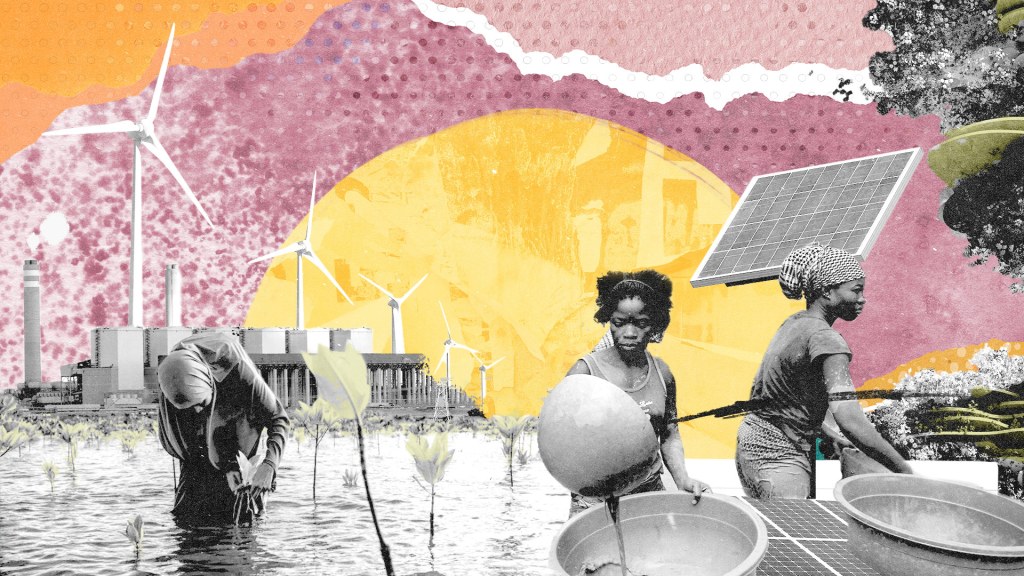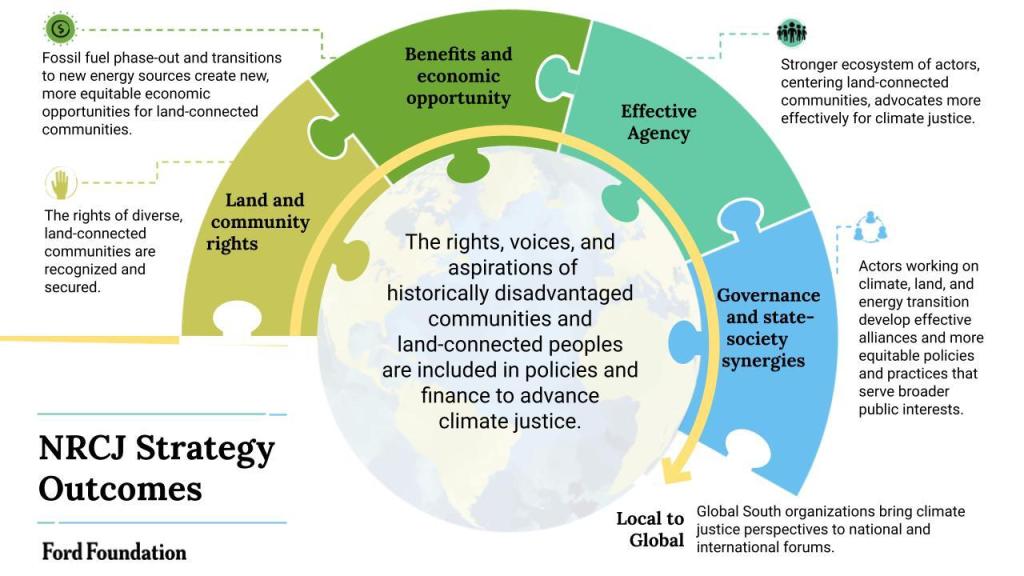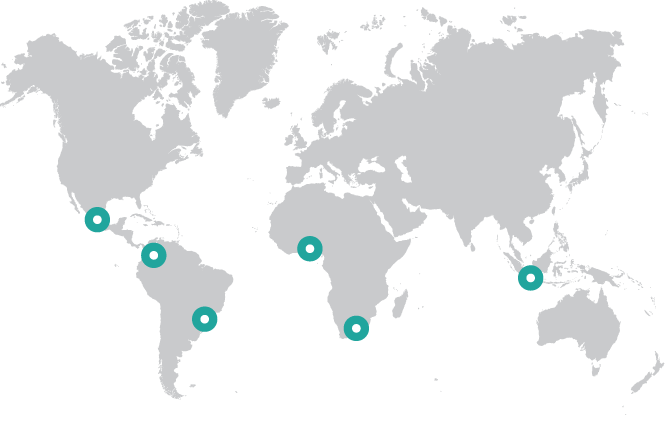International Strategy

As the climate crisis deepens, natural resource extraction in the Global South continues to drive inequality and injustice. Private interests are too often prioritized over the public good, allowing forest clearing and oil, gas, and mineral extraction to go unchecked, displacing communities and further aggravating the climate crisis. The Natural Resources and Climate Justice (NRCJ) program works globally to foster climate justice by advancing solutions that reflect the demands of land-connected communities for secure, collective, customary land rights. NRCJ supports partners who work to ensure the protection of tropical forests and a decarbonization of energy systems that is just and equitable.

The Challenge
Climate change and social injustice are deeply intertwined. Historically, the Global North has extracted wealth from the Global South through the exploitation of natural resources—such as oil, gas, minerals and forests—and dispossessed and marginalized land-connected communities in the process. Private and public sector interests and urban elites within countries also extract wealth from the lands of these same communities. Especially where communities lack legal recognition of their lands, they bear the brunt of environmental degradation and displacement without reaping any significant economic benefits from resource extraction.
The race to mitigate climate change is reproducing and deepening these same injustices.
Rapid shifts to renewable energy, forest protection, and carbon trading risk the further exploitation of communities whose rights over land and to free, prior, and informed consent are not secure. The mitigation of climate change can all too easily become another round of unjust resource extraction.
This risk is deepened as powerful extractive interests increasingly capture state institutions, obstructing climate justice, weakening community rights, and allowing rural violence and illegal economies to grow. This capture is made easier when society-wide coalitions for climate justice are weak, when pockets of innovation and excellence inside government are not supported, and when climate finance is inadequate and fails to reach those who need it most.
The Opportunity
There is clear global recognition that the decarbonization of energy systems and the protection of forests are essential in fighting climate change. Evidence also shows that ensuring local communities have the power and security to manage their lands is often a more affordable and effective approach for forest and biodiversity conservation that improves community livelihoods.
Despite global trends toward authoritarianism and shrinking civic spaces, social movements led by land-connected peoples, youth, feminist, and diverse civil society organizations continue to advocate effectively for rights-based climate action and for just energy transitions. At the same time, innovators and committed public officials working in pockets of excellence within governments also push for these justice-based pathways to mitigating climate change.
Some governments have created new ministries and offices to advance these goals. Even parts of the private sector have come to see that promoting climate justice need not undermine their commercial goals and can, in fact, further these goals.
Alliances and coalitions among these social movements, private sector actors, government offices, and civic actors have emerged to help advance society-wide commitments that prioritize social justice and the reduction of inequalities within efforts to address climate change and promote climate resilience. Philanthropic initiatives can bolster this momentum to promote climate justice.
Our Aim and Approach
We work to put the people most affected by climate injustice at the center of solutions by focusing on three key areas:
Securing Land and Resource Rights
We support efforts to strengthen the land tenure and resource rights of land-connected communities, including Indigenous Peoples, Afro-descendant peoples, and rural communities. With secure rights, these communities can better protect their territories and livelihoods, contribute to forest conservation, and increase the benefits that flow to them from climate change mitigation strategies.
Building Effective Agency and Alliances
We strengthen the capacity of social movements and community organizations to advocate for their rights and influence policies. By fostering alliances among diverse stakeholders, we aim to support broader societal coalitions that can drive systemic change. We support the work of innovators working within government and help connect them with civil society groups.
Promoting Just Energy Transitions
We advocate for energy transition processes that are fair and inclusive, addressing the potential injustices that can arise from the extraction of transition minerals and the shift to renewable energy. This includes supporting policies that responsibly and equitably phase out fossil fuels while promoting renewable energy solutions that benefit everyone.
Our Impact
Our goal is to ensure that the priorities of historically disadvantaged communities and land-connected peoples from the Global South are reflected in policies and practices to advance climate justice globally by 2029. We’re working towards four critical outcomes:
Strengthened Land and Community Rights
Land-connected communities in forested, extractive, and renewable energy regions will have secure and recognized rights to land and free, prior, and informed consent.
Enhanced Agency of Social Movements and Allied Organizations
A stronger ecosystem of actors, centered around land-connected communities, will advocate effectively at all levels, influencing policies and practices related to climate justice.
Equitable Economic Opportunities
Communities affected by energy transitions and resource extraction will gain access to new and more equitable economic opportunities, ensuring that the benefits of decarbonization are shared fairly and do not perpetuate existing inequalities.
Social Coalitions for Inclusive Governance and Policies
Alliances and coalitions among diverse actors, including government and companies, will support and advocate for the development and implementation of policies and practices for mitigating climate change that support land and community protection while serving broader public interests.
Portfolio Snapshot
where we work

number of grantees250
annual budget$30 million
build budget$35 million
build grantees29
Grantee Snapshot

A Rocha Ghana
A Ghanaian grassroots environmental organization, mobilizes local communities to safeguard the Atewa Forest—a critical biodiversity hotspot that serves as a water source for millions. Recognizing the forest’s role in climate regulation and local livelihoods, the organization has built a powerful coalition that amplifies the voices of those most affected by environmental degradation. By combining robust environmental research with strategic advocacy, A Rocha Ghana has brought international attention to the threats posed by mining and deforestation in the region.
A Rocha Ghana demonstrates how community-led initiatives drive systemic change, ensuring that environmental policies include underrepresented populations and uphold their rights in the fight against climate change.